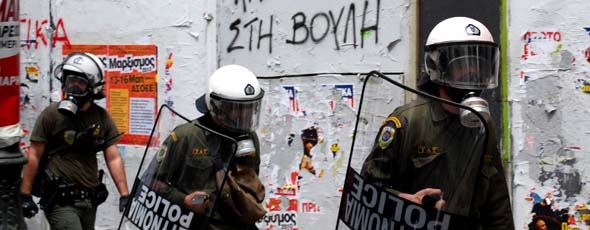
The time was July 2012, almost a month after a second round of elections in Greece produced the Frankenstein-like coalition government, comprised of conservative right-wing New Democracy, faux-socialists PASOK and “left-wing” Democratic Left that was now running the crisis-stricken country. An hour outside Athens, in the town of Loutraki, strikers had blocked the road leading up to the local casino, an important part of the local economy providing hundreds with employment. Locked in a dispute over proposed wage cuts with the owners, the strikers felt cheated and believed their employers were using the crisis as an excuse to attack their already severely strained income.
What they didn’t expect was a visit from a newly elected MP. Accompanied by ten bouncers, the new MP Efstathios Boukouras threatened the strikers under the thin pretext that “we won’t allow the communists to do as they please”. Boukouras belongs to a group calling itself “Golden Dawn”. Riding the wagon of “dissent”, this neo-nazi party won 7% of the popular vote in June. They boasted of “clean hands” and an “anti-systemic” character. They claimed they would defend Greeks from the “dark centres of power” who sought to enslave them.
Is this an isolated incident of a Golden Dawn MP backing local “Big Money”? The party’s track record suggests the exact opposite. The party has voted for indebted football clubs to have their debt cancelled (clubs owned by some of the richest of Greeks, such as the ship and media owner Yiannis Alafouzos), and has supported Piraeus Bank (which is under investigation for shady business deals) in its attempt to acquire Agrotiki, a state-owned bank, for almost nothing, using state-provided money acquired through expensive aid packages. It should not come as a surprise that Golden Dawn disagreed with a proposed tax hike to earnings from shipping activities. Ship owners in Greece are a traditionally powerful body of businessmen that is notoriously untouched by taxation.
Why is this supposedly “pro-people” party lining up behind capitalist interests, and why do the businessmen allow this to happen? The two groups are interlinked in several different ways. Through this symbiosis, the desire of factory and ship owners like Nikolas Manesis, of the Halyvourgiki steel plant, to get their own way, strengthens the neo-nazi party. By opposing strikes and Unions, the party is doing exactly what “big business” has been dreaming of for decades on a global scale.
The Greek elite has been enjoying a lavish lifestyle even now, when 27.7% of Greek citizens are at risk of poverty, as a report by Eurostat showed in February. A very revealing piece by the German magazine Der Spiegel tells us: “The Greek government can no longer pay its bills and owes private-sector companies some €9 billion. But even now, three years into the crisis, it continues to exempt commercial shipping companies, which make up its most successful industrial sector, from all taxes. This relief for the rich just puts more of a burden on the poor.”
Since the publication of the article, the Greek government has taken steps to correct this injustice: in 2013, the government plans to collect as much as 80 million euros from taxing ship-owners. This figure, after many months of protest, has gone up to 140 million now, but for an industry enjoying billions in earnings every year, and which controls more than 20% of global sea trade, this is nothing but “spare change”. To give a sense of proportion, within the same year, 82 million will be cut from disability benefits alone. Isn’t this the kind of behavior the Greek government should be steering away from if they really want to disarm the Golden Dawn’s populist rhetoric?
In reality, very little is done to battle the Greek elite’s tax-dodging. As was demonstrated recently with the state’s reaction over the publication of the now infamous Lagarde list, this government is unwilling to clash with the Greek elite, of which its members are an integral part. It is becoming more and more apparent, as months go by, that the Greek elite tolerates and even supports the neo-nazi party in order to promote its agenda. Reading between the lines of Golden Dawn’s manifesto, one can see their promises for flat-tax rates, fast-track investments and how, through “charity” work, they intend to replace immigrant workers – who are paid nothing for their work – with Greeks who will only suffer the same fate. Their neoliberal aspirations, hidden behind immigrant-bashing populism and nationalistic sentiment, ought to be exposed.
“Resist the selling-off of our country!” reads the party’s website. And it may in fact be time to do so. But keep in mind that it is going to be a fight on two fronts: on the one hand, against an elite that refuses to take responsibility for its shortcomings or to share the burden of the crisis it caused; and on the other, against a gang which has now been granted immunity from prosecution, and which jumps at every chance it gets to support its real bosses.
As the Greek elite’s impunity and cynicism drives an angry and confused people into the arms of these false saviors, who are in fact only the other face of the elite’s neo-feudal aspirations, the game needs to change. For as long as we do not expose and stress the connection between corrupt, long-established capitalist interests and fascism in Greece, we are doomed to keep on fighting the symptom and not the disease that eats away at the country’s morale.
By Yiannis Baboulias (@yiannisbab), a Greek investigative journalist writing on finance and politics.









